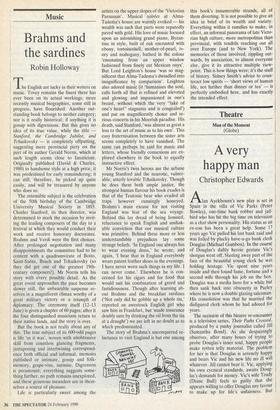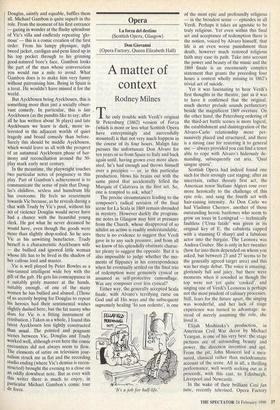Theatre
Man of the Moment (Globe)
A very happy man
Christopher Edwards
Ian Ayckbourn's new play is set in Spain in the villa of Vic Parks (Peter Bowles), one-time bank robber and jail- bird who has hit the big time on television as a chat show personality. His status as an ex-con has been a great help. Some 17 years ago Vic pulled his last bank raid and was foiled by plucky have-a-go bank clerk Douglas (Michael Gambon). In the course of Douglas's daftly heroic gesture Vic's shotgun went off, blasting away part of the face of the beautiful young clerk he was holding hostage. Vic spent nine years inside and then found fame, fortune and a second wife through his job on the box. Douglas was a media hero for a while but then sank back into obscurity in Purley where he is now a double glazing salesman. His consolation was that he married the disfigured clerk whom he had adored for years.
The occasion of this bizarre re-encounter is a television series, Their Paths Crossed, produced by a pushy journalist called Jill (Samantha Bond). As she despairingly observes, after many hours of trying to probe Douglas's inner soul, happy people make rotten telly material. The problem for her is that Douglas is serenely happy and bears Vic and his new life no ill will whatever. Jill cannot bear it. Vic, applying his own cycnical standards, awaits Doug- las's demands for money. Vic's wife Trudy (Diane Bull) feels so guilty that she appears Willing to offer Douglas any favour to make up for life's unfairness. But Douglas, saintly and equable, baffles them all. Michael Gambon is quite superb in the role. From the moment of his first entrance — gazing in wonder at the flashy splendour of Vic's villa and endlessly repeating 'glo- rious' — this is a comic creation of the first order. From his lumpy physique, tight tweed jacket, cardigan and pens lined up in his top pocket through to his grinning good-natured bore's face, Gambon looks the part of the man whose conversation you would run a mile to avoid. What Gambon does is to make him very funny without patronising him. Being in Spain is a treat. He wouldn't have missed it for the world.
But Ayckbourn being Ayckbourn, this is something more than just a socially obser- vant comedy. In particular, this is late Ayckbourn (as the pundits like to say; after all he has written about 36 plays) and late Ayckbourn we learn is dark, more in- terested in the adjacent worlds of quiet tragedy and broad comedy than before. Surely this should be middle Ayckbourn, which would leave us all with the prospect of an autumnal Ayckbourn phase of har- mony and reconciliation around the 50- play mark early next century.
In the meantime, the playwright touches two particular notes of poignancy • in this play. Part of Gambon's achievement is to communicate the sense of pain that Doug- las's childless, sexless and humdrum life has overcome. He feels no resentment towards Vic because, as he reveals during a chat with Trudy by Vic's pool, without his act of violence Douglas would never have had a chance with the beautiful young clerk. He got what he never dreamed he would have, even though the goods were more than slightly shop-soiled. So he sees Vic as his unwitting benefactor. Trudy herself is a characteristic Ayckbourn wife — the bullied and ignored little woman whose life has to be lived in the shadow of her callous lord and master.
Vic is well played by Peter Bowles as a sun-tanned intelligent wide boy with the gift of the gab. He gets his comeuppance in a suitably grisly manner at the hands, suitably enough, of one of the many Women he has bullied and abused. (Those of us secretly hoping for Douglas to repeat his heroics had their sentimental wishes Slightly dashed here, but the fat nanny who does for Vic is a fitting instrument of retribution.) Taken as a whole, 1 found this latest Ayckbourn less tightly constructed than usual. The pointed and poignant scenes between Vic, Douglas and Trudy worked well, although even here the comic encounters did not always seem to flow. The elements of satire on television jour- nalism struck me as flat and the recording studio ending (where Vic's demise is recon- structed) brought the evening to a close on an oddly downbeat note. But as ever with this writer there is much to enjoy, in particular Michael Gambon's comic tour de force.



















































 Previous page
Previous page